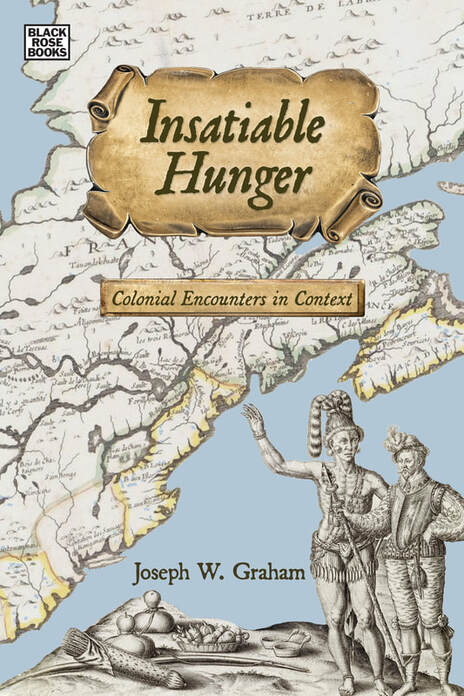Insatiable Hunger Colonial Encounters in Context
|
To Order, click on one of the links below Canada: Chapters Indigo Paragraphe Books U.S.A. Amazon Barnes and Noble Powell's Or contact your favourite independent bookstore. Paragraphe Books has it in their store and we will soon add a list of bookstores that have confirmed they also have it. independent bookstoresMontreal and area
Bibliophile Librairie Clio Librarie Saint Henri Bookswww.facebook.com/sainthenribooks/ Ottawa and area Barely Bruised Books Black Squirrel Books Books on Beechwood Octopus Books Singing Pebble Books Excerpts from an interview with the author
|
Publisher's Abstract The European Wars of Religion of the 16th Century set the stage for a mass migration to a New World that was not so new to its Indigenous peoples. Insatiable Hunger compares and contrasts European historical accounts and Indigenous stories of Contact in order to illustrate the wide cultural chasm that separated the two civilizations. The scale of the mutual incomprehension--and its unbalanced consequences--experienced by both settlers and Indigenous people is the subject of Joseph Graham’s historical exposition. Insatiable Hunger is about the boiling over of ‘religious’ differences in Europe and the desperate need Europeans had to escape, carrying their wars along with them, to protect their models of religion and freedom. It is about religiously-obsessed Europeans pouring onto the continent, uncomprehendingly consuming everything in their path. It is about the attempts Indigenous peoples made to reason with the hungry newcomers. Tracing events from Jacques Cartier’s first visits in the 16th century to the war of 1812, Insatiable Hunger delves back to examine the root causes of the mutual incomprehension in the foundational stories of two very different civilizations. It describes stable Indigenous communities’ collapse in the face of disease and their incapacity to understand the Christian inability to share. Now that descendants of European Settlers are confronting the accepted historical narratives of Contact, Insatiable Hunger comes as an important primer for anyone seeking to expand their understanding of an event that continues to have repercussions today. Finally, Insatiable Hunger points us to pathways of understanding that remain elusive in our property-driven civilization. It presents an appeal to listen to how our society could be returned to a state of balance. Joseph Graham, a historian from the Laurentian mountains north of Montreal, is the author of the best-selling Naming the Laurentians. Reviews
"...This is an important work. It struggles for truth and accuracy in unfolding the story of Canada. I am not a fan of Canada. Canada is the name of the empire that Britain gave our homelands to, but this is clear in the book. What is not clear is what do we do about it. Reconciliation begins with truth and in this case, it is really our homeland, and nothing can be decided without us. We must become the authors of a new story and I think the writer is taking us in that direction, bravely, doggedly and with grim determination." --Lee Maracle is an award-winning poet, novelist, and teacher. She is currently a teacher and Mentor for Indigenous Students at the University of Toronto and a cultural instructor at the Traditional Cultural Director for the Indigenous Theatre School. "Twelve years in the making, Joseph Graham’s Insatiable Hunger makes no excuses for the blind ravages of the Euro-Christian invasion of North America. Grasping the distinction between the Indigenous American gift economy, with its emphasis on nature-connected sustainability, and the Euro-Christian market economy, with its emphasis on wealth accumulation at any cost (to others), Graham wends his way through the meta-history of European colonization, 1535−1814. He places it in the context of, on the one hand, the lack of any Indigenous need for Europeans in the Americas, and on the other hand, the invading Europeans’ desire to escape Christianity’s belligerent factions at home, even as they continued their internecine wars of all against all in America. Having escaped Christianity at home, European began imposing it on Indigenes. Locked in their cultural bubble, disdaining Indigenous societies, the French, Spanish, Dutch, Swedes, and British invaders then pushed relentlessly inland, spreading lethal diseases visiting mortality rates on Indigenous nations that fell below population sustainability. What disease and siege did not take, liquor did. Throughout, Graham’s lingering question is how the damage is repaired, as he urges moving from hierarchical markets to egalitarian gift relations. Eminently readable, Graham’s clear and unpretentious yet documented prose respects Indigenous stories as much as Euro-Christian stories in contrasting Indigenous female-male co-valence with European male dominance. " --Barbara Alice Mann, Ph.D., Professor of Humanities at Jesup Scott Honors College and author of numerous books, including Spirits of Blood, Spirits of Breath, The Twinned Cosmos of Indigenous America (2016). "Europeans doing good and getting rich. If you want to understand the toxic impact of Christianity and the market economy on the Indigenous peoples of North America, then read this book. If you want to reflect on the astonishing durability of Indigenous cultures and world views and the promise they hold for a planet in search of sustainability, read this book. A work of great erudition and passion." --David Cameron, CM, FRSC, Professor of Political Science, University of Toronto |
